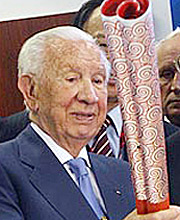|
 |
|
Juan Antonio Samaranch holds Xiangyun, Beijing Olympic Game's torch in July 2007 (BOCOG) |
The sporting and organizational success of the recent Olympic Games in Beijing, unanimously recognized by international public opinion, inspires me to share with readers the origins of and reasons for my long friendship with the Chinese people.
In the full swing of democratic transition, King Juan Carlos I appointed me as Spain's ambassador to the Soviet Union and Mongolia in 1977, the first Spanish representative in Moscow since the reestablishment of diplomatic relations with the then USSR. I cannot conceal that this assignment enabled me to consciously prepare for my election to the Presidency of the International Olympic Committee (IOC) once Lord Killanin, the then president, had announced that he did not intend to stand for re-election.
My experience in Moscow was exciting: the city and its authorities were immersed in the process of organizing the Games of Olympiad, held in July 1980, and the Soviet capital was constantly hosting IOC members following the organizational work.
These contacts with my IOC colleagues allowed me to share with them my future Olympic ambitions, thus earning me their trust with a view to the ballot box.
Also during this period, very discreetly, contacts were initiated with then mayor of Barcelona, Narcls Serra, raising the idea that if I was elected as IOC president, Barcelona could present its candidature to host the Games.
All went according to plan. After I was elected at the 83rd IOC Session, I resumed my conversations with Serra with a view to taking up the challenge that had been pending for many generations: Barcelona, Olympic City!
During my assignment in the Spanish embassy in Moscow, I was able to count on the collaboration of the embassy's first secretary, Eugeni Bregolat, who was then a young diplomat who would go on to have a brilliant career, becoming Spanish ambassador to China on two occasions, a unique feat in the diplomatic world. During this period as a representative of Spain, he maintained good relations with other colleagues from friendly countries. I remember especially the ambassador of the Federal Republic of Germany, who, years later, during his assignment as a high-ranking FRG information service official, gave me a lot of help with the drawn-out difficulties faced with the Seoul Games in 1988.
Contacts between diplomats were regular, and I went fairly frequently to the embassy of the People's Republic of China, in the Lenin Hills. We held meetings in a conveniently padded room to avoid the possibility of the conversations being recorded.
During these years, although the USSR and China professed a communist ideology, they were very far apart and their different politics were obvious.
In these circumstances, we started to deal with the inclusion of China in our organization. We owe the first steps to my predecessor, President Killanin, although concrete discussions started in 1979.
This historic opportunity could not be missed, and four months after I became president, we reached an unprecedented compromise, mainly thanks to the generosity of the leaders of the People's Republic of China. At the time Deng Xiaoping, the real architect of New China, initiated its opening up to the West and implemented the first economic reforms.
Thanks to the practical sense displayed by the Chinese, the Chinese Olympic Committee was recognized and we kept the Olympic Committee of Chinese Taipei in our organization.
I had the chance to thank Deng Xiaoping, small in stature but a giant in historical vision, for his great generosity on the occasion of an invitation sent to me in 1984 to be present on the stand of honor at the entrance to the Forbidden City. This stand of honor is used for the great military parades on Tian'anmen Square. I was greatly surprised to realize that the only Western guests on this stand of honor were my wife and myself, as the written accounts confirm.
My support for Olympic recognition of Chinese sport would suggest that the People's Republic of China now regarded me as a loyal friend. And subsequently the opportunity to demonstrate this arose.
In 1984, the USSR called for a boycott of the Olympic Games in Los Angeles. Even though the USSR Sports Minister Marat Gramov assured me that they were not in favor of a boycott, the threat was there. Conversations with George Shultz, Secretary of State under the Reagan administration, and then USSR Minister of Foreign Affairs Andrei Gromyko inevitably led to a boycott, despite my negotiation efforts.
| 
